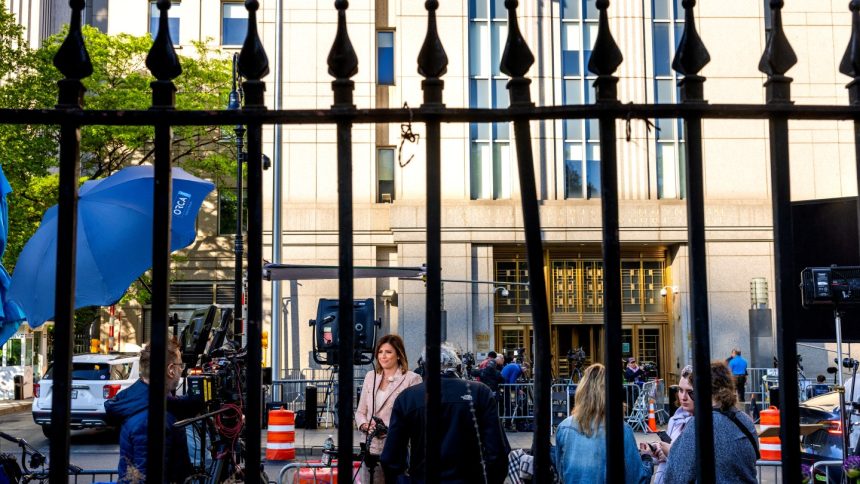In Closing Argument, Prosecutors in Diddy Trial Meticulously Lay Out Case for Guilty Verdict
After spending six weeks calling witnesses and presenting evidence against rap and fashion mogul Sean “Diddy” Combs at a lower Manhattan court, the team of six women federal prosecutors told the jury in the prosecution’s closing arguments that the onetime pop culture titan was, without a doubt, “the leader of a criminal enterprise.”
Combs faces five counts including one count of racketeering conspiracy; two counts of sex trafficking by force, fraud or coercion; and two counts of transportation to engage in prostitution. He pleaded not guilty after his September arrest and has said that he has not committed any of the crimes of which he’s been accused.
On Thursday, Assistant U.S. Attorney Christy Slavik presented the government’s closing salvo, focusing first on the racketeering conspiracy charge Combs faces and then moving into the sex trafficking allegations, specifically regarding two of his ex-girlfriends, Cassandra “Cassie” Ventura and the pseudonymously named “Jane.”
On the racketeering charge, Slavik informed the jury that they must be unanimous in their voting that Combs knowingly and willfully agreed that he, or a co-conspirator, would commit two acts of racketeering. Slavik said there is evidence of multiple acts committed by Combs and his “enterprise”: drug distribution, kidnapping, an arson attack, bribery, facilitating sex trafficking, facilitating travel for commercial sex (for Ventura, “Jane” and several male sex workers), forced labor and covering up crimes. Slavik then laid out how the past six weeks of testimony provide examples of these acts.
On the drugs accusation, Slavik told jurors it must be proven that a co-conspirator knowingly distributed drugs. Once drugs (meth, cocaine, ecstasy and other substances) were delivered by his staff, the court learned, “he gave them to Cassie and Jane,” Slavik said. “This is drug distribution, plain and simple.” The kidnapping allegations related to testimony from Capricorn Clark that Combs came to her late at night and forced her into a car at gunpoint. They then drove to rapper Kid Cudi’s Hollywood Hills home, where Combs and a staffer allegedly broke in. Later, reflecting Combs’ earlier threats, Kid Cudi’s Porsche was bombed with a Molotov cocktail (this incident allegedly illustrating the arson attack charge).
“Of course, the defendant was behind this. Now it shouldn’t come as a surprise to you that we’re not suggesting the defendant personally cut the hole in Kid Cudi’s Porsche,” Slavik said. “You heard the audio notes. The defendant didn’t even buy his own soup.”
The bribery charge related to the harrowing footage, shown over 10 times throughout the trial to jurors, of the moment in 2016 when Combs assaulted Ventura in an elevator lobby at the InterContinental Hotel. The defendant has previously admitted to and apologized for the incident. Nevertheless, the footage has become central to the case against him and severely damaged his public reputation when it leaked to CNN last year.
“The defendant knew what he had done and knew the potential consequence,” Slavik said. “He knew that he could be arrested if the police knew what he did to Cassie at that hotel.”
Kristina Khorram, Combs’ former chief of staff, and D-Roc, then his loyal lead security guard, allegedly led an effort to get the footage from a security guard. Ultimately, Khorram tracked down the video surveillance footage and found hotel personnel to speak with about buying the only copy — which they did, together, for $100,000, paid to a staffer in cash and ultimately split between three men working at the hotel. Deputizing Khorram and D-Roc is a prime example of how Combs operated with his staff, which prosecutors allege was a “criminal enterprise.” Slavik mentioned that Combs told the staffer who took the cash not to make any big purchases with it.
“That moment tells you everything you need to know about the defendant’s purpose in paying this bribe — think about why the defendant said that,” she told the jury. “[This incident shows] the defendant’s assault of Cassie during a “freak-off” and members of the Combs’ enterprise not stopping at anything to make sure the video wouldn’t fall into the hands of law enforcement.”
The sex trafficking and forced labor elements mentioned, the prosecutor explained to the jurors, relate to the defendant’s actions towards Ventura and “Jane,” who were both subjected to Combs’ “freak-off” or “hotel-night” events, in which they engaged in drug-fueled sex marathons that would involve hired male sex workers, could last up to four days, and at times left them exhausted, bruised and with infections. This led to the two charges Combs is also facing regarding sex trafficking. Slavik likened participation in “freak-offs” to work and more specifically, forced labor. During her marathon testimony, Ventura did the same, telling the court that her “freak-off” attendance — at times done to please her boyfriend but at other times done to keep him from lashing out and beating her — was tantamount to a job. It became just that, Ventura testifies, as her once promising career as a singer slipped away.
Drugs, violence and threats of financial harm and the release of the video recordings were all tools used by Combs to control and manipulate these two women, Slavik told the jurors, and he “counted on silence and shame” to ensure that his control over them would endure over time. He also relied heavily on his staff, who arranged the events, delivered the supplies, helped with logistics of travel and cleaned up the mess made in the various hotel rooms that were frequently trashed and covered in “freak-off” wreckage, walls and floors smeared with baby oil.
The jurors must find that the defendant used force, fraud, threats or coercion to make Ventura and “Jane” participate in the “freak-offs” or “hotel nights”; the men and women of the jury were told that any combination of these or a single tactic will count as Combs being guilty of trafficking these women. Slavik outlined how three nights involving “Jane” shows how this was not a relationship of romance but one of coercive control that began with classic “love bombing.”
“The defendant started grooming Jane, slowly introducing her to the different elements of ‘freak-offs,’” Slavik said. After their first hotel night, “Jane” said that she felt like she opened “Pandora’s box.”
Slavik also addressed the contention that both Ventura and ”Jane” at points willingly participated in the wild orgies, telling jurors, “The fact that a victim consents once to a commercial sex act — that doesn’t mean that she consented every time,” the prosecutor said. “You only need to find that one of these ‘hotel nights’ meets the definition of sex trafficking here.”
From here, Slavik detailed the years of what she said was coercive control through threats, violence, intimidation and the use of his staff that prosecutors believe fit squarely into the charges he faces. Repeatedly, the closing argument hammered that Combs and his inner circle refused to take no for an answer from these women.
“The defendant’s conduct had one purpose — to get Jane to agree to do ‘hotel nights,’” Slavik said. “And because the defendant knew exactly what he was doing, this was sex trafficking.”
Details of what constitutes sex trafficking were made clear at one point. This include recruiting, enticing and harboring the victim; acting with reckless disregard; and interstate commerce. Slavik explained how this worked for both of Combs’ girlfriends, telling jurors it involved financial control to ensure they were dependent on him and therefore more willing to participate in his sexual marathons.
The closing arguments began at about 10 a.m. and wrapped at about 4:15 p.m., taking up nearly an entire day in court. On Friday, the defense will argue how none of the charges Combs has been accused of will be proven. If the opening statements are an indicator, the defense team will go even longer in closing out their case.
Closing out her marathon summary of the case, Slavik made a plea to — or perhaps a demand — of the jury.
“All of this evidence paints a clear picture of how the defendant committed crimes. Up until today, he was able to get away with it because of his money, his power (and) his influence,” she said. “That stops now. It’s time for justice. It’s time to find the defendant guilty.”







